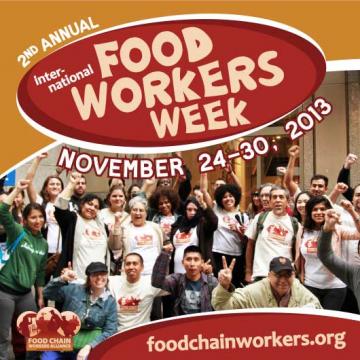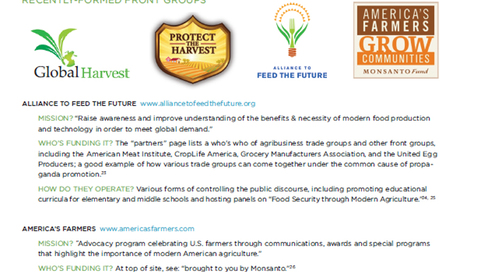When I was asked yesterday by POLITICO to comment on a press release from the Robert Wood Johnson Foundation celebrating the food industry’s alleged reduction in calories, I thought, Oh, that data we’ve been waiting for is finally is published. But I was wrong. As I reported last June, a collection of food companies calling themselves the “Healthy Weight Commitment Foundation” jumped the gun with a self-congratulatory release claiming to have made good on its 2010 “pledge” with the first lady’s Let’s Move campaign to reduce the number of calories in the food supply by 1.5 trillion.

Public Health
Holding Big Food Accountable for False Claims of Responsible Marketing to Children
by Michele Simon and Cara Wilking

Looking back at 2013, while the food movement made progress in certain areas (such as school food and GMO labeling), when it comes to exploitative food marketing to children meaningful change remains elusive. Let’s Move director and White House chef Sam Kass recently acknowledged the obvious when he said this issue was “really tough” given how much money is at stake for industry.
All we seem to hear from the major food corporations about marketing to children are self-serving promises and announcements of future changes. As public health lawyers, that got us wondering, who’s making sure even these minimal commitments are being kept? The question is worth exploring if we want to actually improve children’s diets—not just create positive PR buzz for Big Food. With reports of adults ever-deteriorating eating habits in 2013 coupled with appalling teen heart health, the health stakes are too high to just wait for the food industry to do the right thing.
How Low Can McDonald’s Go to Disrespect its Workers?
It seems both ironic and fitting that while most Americans are obsessed with food for the Thanksgiving holiday, this week also marks International Food Workers Week, organized by the Food Chain Workers Alliance.
While many large restaurant chains and other sectors of the food industry bear responsibility for mistreating their workers, recently, McDonald’s has engaged in a series of jaw-dropping and idiotic communications with its workforce. Each one is a painful reminder of how impossible it is to live on fast-food wages.
Clowning Around with Charity: How McDonald’s Exploits Philanthropy and Targets Children
New report from Eat Drink Politics exposes McDonald’s charitable activity as a marketing tool to deflect critics
Pop quiz: Who do you think funds the hundreds of Ronald McDonald Houses around the nation? McDonald’s right? Sort of, but not really. While McDonald’s gets 100 percent of the brand benefit from Ronald McDonald House Charities, the burger giant only provides about 20 percent of its funding globally. At the local level, it’s closer to ten percent, with some of that money coming from donation boxes at McDonald’s outlets, that is, from customers.
Super-Sized Lies: Why You Can’t Trust Promises by McDonald’s

McDonald’s CEO Don Thompson, former President Bill Clinton, and Alliance for a Healthier Generation’s Dr. Howell Wechsler.
The headlines certainly sounded impressive: “McDonald’s to Scrap Soda From ‘Happy Meal’ Ads” and “McDonald’s Ditches Soda In Happy Meal Menus.” In a grandiose announcement from the Alliance for a Healthier Generation (an offshoot of the Clinton Foundation), McDonald’s proved once again that it’s not only the world’s fast-food leader, but also the king of spin. This time, Bill Clinton himself was on hand for the nifty photo op with McDonald’s CEO Don Thompson at the Clinton Global Initiative’s annual meeting. Despite the seal of approval from the (mostly vegan) former president, I’ve learned to approach these sorts promises from McDonald’s with skepticism.
Save the Food Stamp Program by Reforming It
With each attempt to pass the 2012 farm bill (yes, it has been that long), congressional Republicans keep ratcheting up their cruelty to poor Americans. While last year’s bill would have cut $16 billion to food stamps, the House of Representatives has now proposed an astonishing $39 billion reduction in benefits over 10 years. While many media pundits are outraged, and rightly so, missing from the national conversation are important questions about the effectiveness of the Supplemental Nutrition Assistance Program, or SNAP, the federal food assistance plan formerly known as food stamps. Read rest at Al Jazeera America …
Media Coverage of Report: And Now a Word From Our Sponsors
In January, I released a report called, And Now a Word from Our Sponsors: Are America’s Nutrition Professionals in the Pocket of Big Food? The report continues to receive media attention, in part due to a Change.org petition asking the Academy to clean up its act. Be sure to sign on. Also, please support Dietitians for Professional Integrity, a new group of dedicated registered dietitians working to change the Academy’s sponsorship policies.
Nutrition Standards Won’t Fix Big Food’s Worst Child Marketing Tactics
Last month, I participated in an important panel at a childhood obesity conference to discuss the current strategy backed by some advocacy groups: asking industry to market “healthier” foods to children. But as Susan Linn and I recently argued, any marketing to children is harmful, regardless of the product’s nutritional content. Instead of begging corporations to tweak the grams of sugar, fat and salt that these highly processed junk foods contain, we should demand that industry stop exploiting children altogether. Some advocates argue this approach is too radical. But it’s actually far more practical and ultimately more effective because of certain key tactics that industry uses to target children.
Read rest at Corporate Accountability International.
How Did a Hepatitis Virus Get into Organic Berries?


It seems hardly a week goes by without another foodborne illness outbreak. This time, in frozen organic berries, proving once again that even the health-conscious are not immune from getting sick. Although you wouldn’t know it from the packaging, the contaminated fruit came from overseas, raising several questions such as: Can we trust the USDA organic seal on imported food? I address this and other issues about our globalized food system in my latest article for Center for Food Safety, which you can read on their site here.















